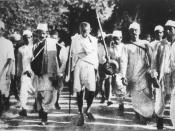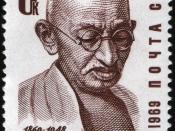During the post World War II period, many one-time colonies achieved political independence. However, these newborn nations were still dependent on powerful allies to survive. A nation is truly independent when it is able to survive culturally, economically, and militarily without the aid of any other nations. As long as a nation is dependent on its ally's support, it can be manipulated into undesirable decisions.
India gained political independence from Britain, but it had to deal with internal chaos, as well as rely on the Soviet Union to protect it from it's rivals, and potential enemies.
India's struggle for independence began during the end of the 19th century. As the more educated citizens of India, mostly lawyers, teachers, and journalists, started studying the theories of Western democracy, more and more became convinced that they were not receiving the full rights of the British citizen. Once the seeds of Indian nationalism were sewn, they began to sprout in the form of the Indian National Congress. The organization's purpose was to debate British policy towards India, and to push for social and economic reform. However, the moderate methods of Congress, having little success, eventually gave way to more direct approaches. The Hindu landlords in Bengal, for example, pushed a boycott on British imports, causing an increase in the development of local industries for several years. Others formed small terrorist groups to assassinate several British officials. Although these methods proved somewhat effective, a much greater force than petty uprisings was required if India wanted to gain independence.
Mohandas Gandhi, and Indian lawyer, probably played the most important role in India's fight for independence. Gandhi used acts of civil disobedience to resist British authority. Lead by Gandhi, Indian citizens organized boycotts, and broke laws that they considered unfair, to persuade the British...


